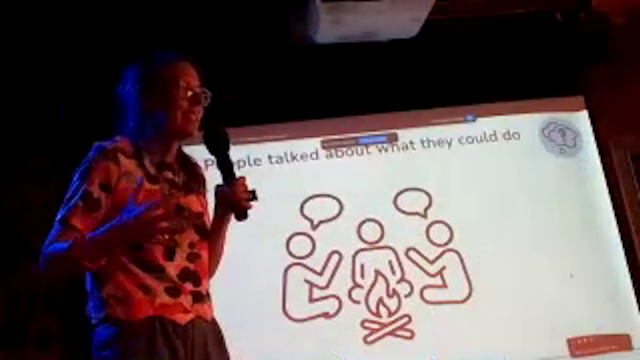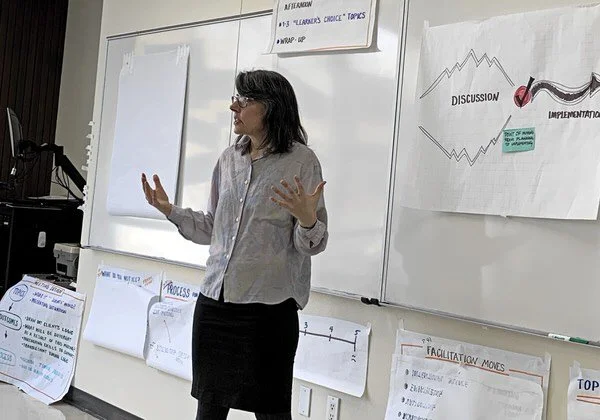Sarah Lightfoot, MA, Organization Development
is a seasoned change agent who partners with mission-focused small businesses, organizations, and community groups to create desired futures.
After nearly a decade in director-level leadership service in nonprofit organizations, Sarah is now a scholar-practitioner of human systems. In addition to her consulting work, she frequently guest lectures at San Jose State University, Mills College, and University of San Francisco.
In recent years, Sarah has come to understand that some of the skills and perspectives she brings to this work stem from her neurodivergence, specifically AuDHD. This is a strength that helps her identify patterns and insights on multiple levels simultaneously, and to leverage an awareness that group participants have varied ways of processing information. This asset supports her work with neurotypical and neurodivergent clients alike.
Sarah facilitates a community convening.
Services
Group Facilitation
After many hundreds of hours of group dynamics experiential labs, coaching, and client facilitation, Sarah is skilled at making candid in-the-moment observations that support group insights, and at bringing out the creativity of participants to discover new solutions. Her meeting designs support inclusion and are highly adaptable to clients’ needs. Services range from retreats to redesigning standing staff meetings for energy, purpose, and function.
“Sarah’s facilitation was inclusive, human, and outcomes-oriented. She helped us do our best work by surfacing the diversity of ideas in the room while identifying shared themes we could build on to move forward. With her help, we had clarity of purpose and unity even as we brought different perspectives.”
Larger Gatherings for Shared Narratives and Action: From “Me” To “We”
Sarah’s use of technology and qualitative theming expertise goes beyond surface polling to cultivate deeper insight and mutual understanding. She identifies key questions on the client’s crucial issues, gathers and analyzes individual comments into themes, and delivers summary statements to the group, connecting individual views to those of other participants. The process delivers a renewed experience of the whole — a narrative of the “we” that is in the room — even in the face of conflicting or disparate perspectives. It also delivers a product — a community brief that memorializes insights and documents next steps.
“The instant theming is a very fun feature.”
“I appreciated the live table input along with simultaneous compilation of results.”
“I liked the small table groups and how they were led because I and many others have difficulties speaking in big groups. This brought intimacy and liked having people taking turns and being able to talk without being judged.”
Sustainable Systems Change Initiatives
Sarah partners with clients to design right-sized participation that works with complexity for sustainable change. Top-down leader-driven mandates and “expert solutions” are not deep enough for lasting change. They seldom adequately involve those who are responsible for or affected by the change, and often reflect a false hope of finality and certainty. The desire for secure ground is understandable, but can ultimately result in failure. Whether it's strategy building, a pivot for budget cuts (or increases!), succession planning, or team structure, Sarah guides groups in effective adaptive and scenario planning, and liberatory design for inclusion and greater capacity for team self-management.
“Exciting to me is the sense of emergence — like a rumble, creation. Excited and feeling more included and wanting to be more included.”
“When I first came here everything was done by committees — by someone else. This process with everyone putting in their thoughts and feelings is great.”
“We're now better trained to learn to work together with consensus rather than ‘my way is the highway.’”
Services
How I work
Board Chair & CEO (or ED) “Level-Set”
We usually start here, this builds towards the other services. Potential Indicators:
Outcomes:
Commitments
After any hundreds of hours of group dynamics experiential labs, coaching, and client facilitation, Sarah is skilled at making candid in-the-moment observations that support group insights, and at bringing out the creativity of participants to discover new solutions. Her meeting designs support inclu
$1,000 for organizations with budgets under $999K.
$2,000 for organizations with budgets $1-$3M.
$3,500 for organizations $3M+
After many hundreds of hours of group dynamics experiential labs, coaching, and client facilitation, Sarah is skilled at making candid in-the-moment observations that support group insights, and at bringing out the creativity of participants to discover new solutions. Her meeting designs support inclusion and are highly adaptable to clients’ needs. Services range from retreats to redesigning standing staff meetings for energy, purpose, and function.
“Sarah’s facilitation was inclusive, human, and outcomes-oriented. She helped us do our best work by surfacing the diversity of ideas in the room while identifying shared themes we could build on to move forward. With her help, we had clarity of purpose and unity even as we brought different perspectives.”
Larger Gatherings for Shared Narratives and Action: From “Me” To “We”
Sarah’s use of technology and qualitative theming expertise goes beyond surface polling to cultivate deeper insight and mutual understanding. She identifies key questions on the client’s crucial issues, gathers and analyzes individual comments into themes, and delivers summary statements to the group, connecting individual views to those of other participants. The process delivers a renewed experience of the whole — a narrative of the “we” that is in the room — even in the face of conflicting or disparate perspectives. It also delivers a product — a community brief that memorializes insights and documents next steps.
“The instant theming is a very fun feature.”
“I appreciated the live table input along with simultaneous compilation of results.”
“I liked the small table groups and how they were led because I and many others have difficulties speaking in big groups. This brought intimacy and liked having people taking turns and being able to talk without being judged.”
Sustainable Systems Change Initiatives
Sarah partners with clients to design right-sized participation that works with complexity for sustainable change. Top-down leader-driven mandates and “expert solutions” are not deep enough for lasting change. They seldom adequately involve those who are responsible for or affected by the change, and often reflect a false hope of finality and certainty. The desire for secure ground is understandable, but can ultimately result in failure. Whether it's strategy building, a pivot for budget cuts (or increases!), succession planning, or team structure, Sarah guides groups in effective adaptive and scenario planning, and liberatory design for inclusion and greater capacity for team self-management.
“Exciting to me is the sense of emergence — like a rumble, creation. Excited and feeling more included and wanting to be more included.”
“When I first came here everything was done by committees — by someone else. This process with everyone putting in their thoughts and feelings is great.”
“We're now better trained to learn to work together with consensus rather than ‘my way is the highway.’”



